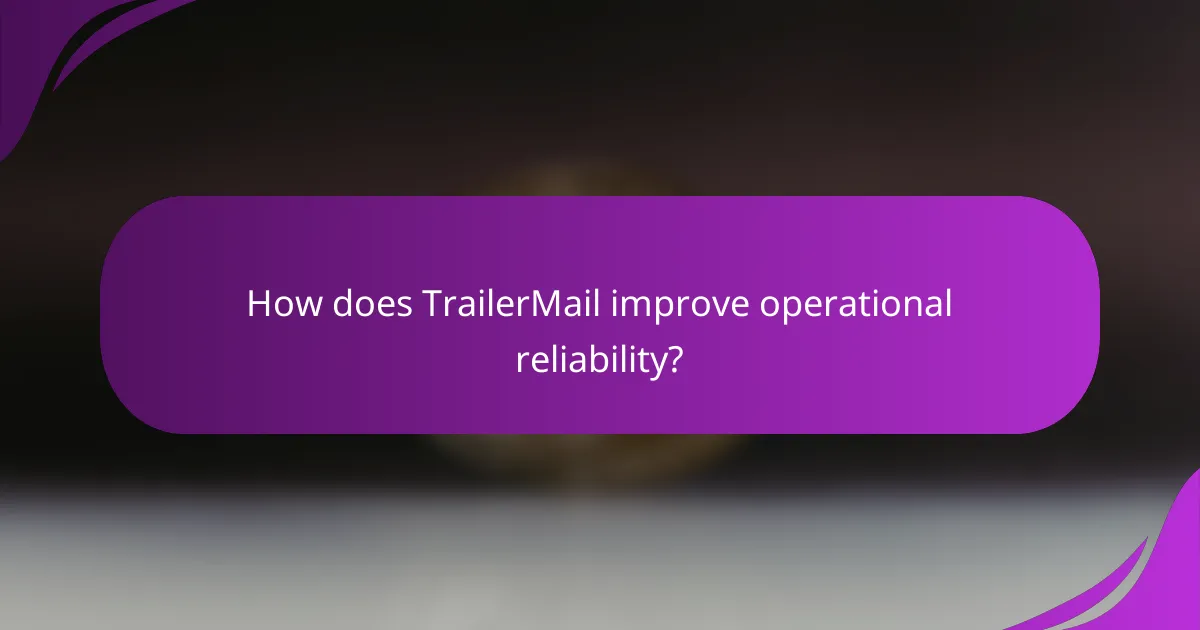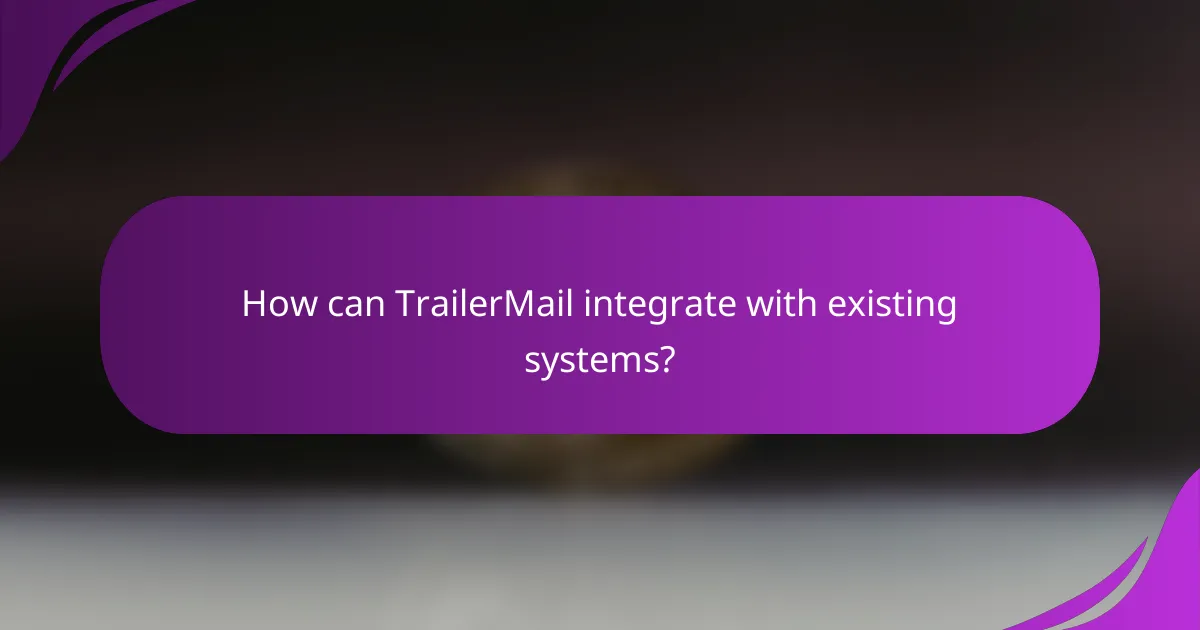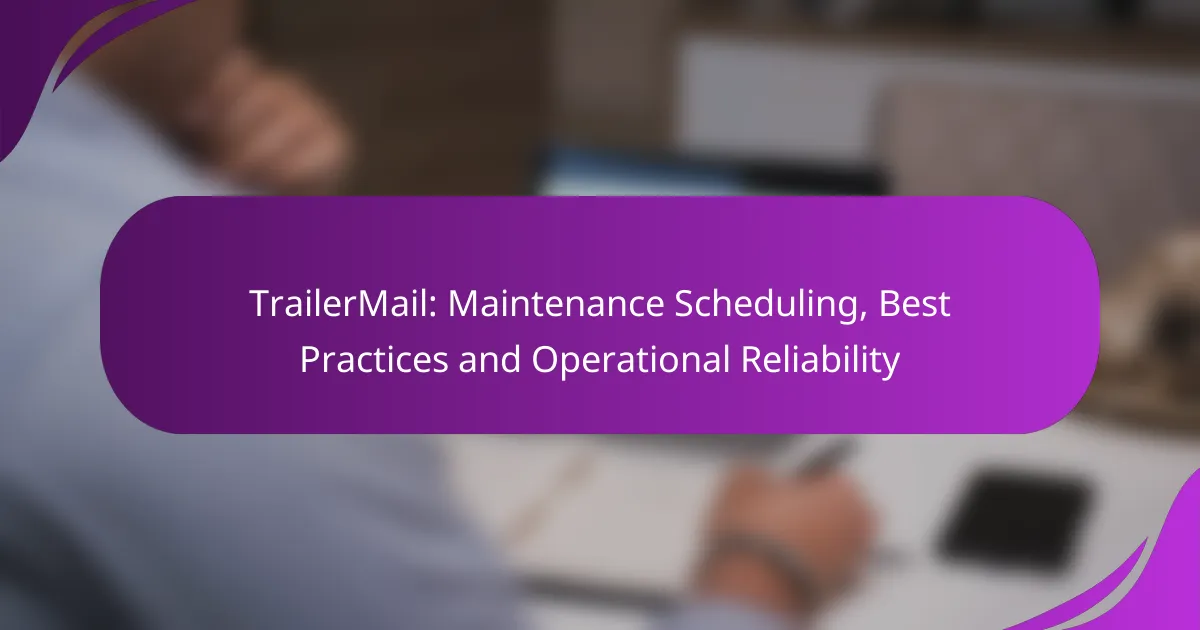TrailerMail revolutionizes maintenance scheduling by providing fleet managers with essential tools to enhance operational reliability. By streamlining processes, offering customizable schedules, and delivering timely vehicle status updates, it minimizes downtime and ensures efficient maintenance tasks. This proactive approach not only improves fleet performance but also helps maintain compliance with safety standards.

What are the best practices for maintenance scheduling in the UK?
Effective maintenance scheduling in the UK involves regular inspections, utilizing software tools, training staff, documenting maintenance history, and setting up alerts. These practices enhance operational reliability and ensure compliance with safety standards.
Regular inspection intervals
Establishing regular inspection intervals is crucial for maintaining trailers. Inspections should occur at least every 6 to 12 weeks, depending on usage and regulatory requirements. This helps identify potential issues before they escalate into costly repairs.
Consider creating a maintenance calendar that aligns with operational schedules. This ensures that inspections do not disrupt daily activities while keeping equipment in optimal condition.
Utilizing maintenance software
Implementing maintenance software can streamline scheduling and tracking. These tools allow for automated reminders, tracking of service history, and management of maintenance tasks. Popular options include Fleetio and Maintenance Connection.
Choose software that integrates well with existing systems and provides user-friendly interfaces. This will enhance adoption among staff and improve overall efficiency in maintenance operations.
Training staff on protocols
Proper training for staff on maintenance protocols is essential for successful implementation. Ensure that all employees understand the importance of regular checks and how to perform them effectively. This can reduce the likelihood of human error during inspections.
Consider conducting regular training sessions and providing easy-to-follow manuals or checklists. This will help reinforce best practices and keep safety at the forefront of operations.
Documenting maintenance history
Keeping a detailed record of maintenance history is vital for tracking performance and compliance. Document every inspection, repair, and service performed, including dates and findings. This information is useful for audits and can help identify recurring issues.
Utilize a centralized database or maintenance software to store this information. This ensures easy access for review and helps in making informed decisions about future maintenance needs.
Setting up alerts and reminders
Setting up alerts and reminders for upcoming maintenance tasks can significantly improve adherence to schedules. Automated notifications can be configured within maintenance software to remind staff of due inspections or services.
Consider using mobile apps that send push notifications to staff, ensuring they stay informed about their responsibilities. This proactive approach minimizes the risk of missed maintenance tasks and enhances operational reliability.

How does TrailerMail improve operational reliability?
TrailerMail enhances operational reliability by streamlining maintenance scheduling and providing timely updates on vehicle status. This proactive approach minimizes downtime and ensures that maintenance tasks are completed efficiently, leading to improved fleet performance.
Real-time tracking of maintenance
TrailerMail offers real-time tracking of maintenance activities, allowing fleet managers to monitor the status of each vehicle at any moment. This feature helps identify overdue maintenance tasks and prioritize them based on urgency, ensuring that vehicles remain in optimal condition.
By utilizing GPS and telematics data, TrailerMail can provide alerts when maintenance is due or if a vehicle is experiencing issues. This immediate feedback loop helps prevent minor problems from escalating into costly repairs.
Automated scheduling features
The automated scheduling features of TrailerMail simplify the maintenance process by generating schedules based on vehicle usage and manufacturer recommendations. This ensures that maintenance is performed at the right intervals, reducing the risk of unexpected breakdowns.
Fleet managers can customize scheduling preferences, such as frequency and types of maintenance tasks, to align with their operational needs. This flexibility helps maintain a consistent maintenance routine, which is crucial for reliability.
Integration with fleet management systems
TrailerMail seamlessly integrates with existing fleet management systems, enhancing operational efficiency. This integration allows for centralized data management, where maintenance records and vehicle performance metrics are easily accessible.
By consolidating information from multiple sources, fleet managers can make informed decisions about vehicle maintenance and replacements. This holistic view helps identify trends and optimize fleet operations, ultimately improving reliability and reducing costs.

What are the key features of TrailerMail?
TrailerMail offers essential features that enhance maintenance scheduling and operational reliability for fleets. Its tools focus on customizable schedules, robust reporting, and a user-friendly interface, making it easier for fleet managers to optimize vehicle upkeep.
Customizable maintenance schedules
TrailerMail allows users to create maintenance schedules tailored to specific fleet needs. This flexibility helps ensure that each vehicle receives timely service based on usage patterns and manufacturer recommendations.
For example, users can set reminders for routine checks, oil changes, and tire rotations. Custom schedules can be adjusted based on seasonal demands or operational changes, helping to maximize vehicle performance and minimize downtime.
Reporting and analytics tools
The platform includes comprehensive reporting and analytics tools that provide insights into maintenance history and operational efficiency. Users can track key performance indicators (KPIs) to identify trends and areas for improvement.
Reports can highlight maintenance costs, vehicle availability, and compliance with safety regulations. This data-driven approach enables fleet managers to make informed decisions, optimizing resource allocation and reducing unexpected breakdowns.
User-friendly interface
TrailerMail features a user-friendly interface designed for ease of navigation. This intuitive layout allows users to quickly access maintenance schedules, reports, and alerts without extensive training.
With a clean design and straightforward functionality, users can efficiently manage their fleet’s maintenance tasks. This simplicity helps reduce the likelihood of errors and ensures that critical maintenance activities are not overlooked.

How can TrailerMail integrate with existing systems?
TrailerMail can seamlessly integrate with existing systems through various methods, enhancing operational efficiency and data management. By utilizing APIs and data import/export features, businesses can ensure that their current tools work harmoniously with TrailerMail.
API access for third-party tools
TrailerMail offers robust API access that allows third-party tools to connect and interact with its platform. This integration enables users to automate workflows, synchronize data, and enhance functionality without manual intervention. For instance, logistics companies can link their fleet management software to TrailerMail to streamline maintenance scheduling.
When considering API integration, it’s essential to evaluate the documentation provided by TrailerMail. Ensure that your team has the technical expertise to implement and maintain these connections effectively. Common pitfalls include inadequate testing and failure to monitor API performance, which can lead to disruptions.
Data import/export capabilities
Data import and export capabilities in TrailerMail facilitate the transfer of information between systems, ensuring that all relevant data is accessible and up-to-date. Users can easily import maintenance records, schedules, and operational data from other platforms, reducing data entry errors and saving time.
To maximize the benefits of data import/export, establish a regular schedule for syncing data. This practice helps maintain data integrity and ensures that all systems reflect the latest information. It’s advisable to use common formats like CSV or Excel for compatibility, and always back up data before making significant changes.

What are the pricing plans for TrailerMail?
TrailerMail offers flexible pricing plans designed to accommodate various operational needs. Users can choose between monthly subscriptions or annual plans, with options that cater to different levels of service and features.
Monthly subscription options
TrailerMail provides a straightforward monthly subscription model, allowing users to pay on a month-to-month basis. This option is ideal for businesses that prefer flexibility or are just starting out and want to test the service without a long-term commitment.
Pricing typically ranges from around $20 to $50 per month, depending on the features selected. Users should evaluate their specific needs, such as the number of trailers managed and the level of customer support required, to choose the best plan.
Annual pricing discounts
For those looking to save on costs, TrailerMail offers significant discounts for annual subscriptions. Opting for an annual plan can reduce the overall expenditure by approximately 10% to 20% compared to monthly payments.
This option is beneficial for businesses with stable operations that expect to use the service long-term. Annual plans often include additional features or enhanced support, making them a cost-effective choice.
Free trial availability
TrailerMail typically provides a free trial period, allowing potential users to explore the platform before committing to a subscription. This trial usually lasts for about 14 to 30 days, giving users ample time to assess the features and functionality.
During the trial, users can fully experience the service without any financial obligation. It is advisable to take advantage of this offer to ensure that the platform meets your operational requirements before making a purchase decision.

What are the common challenges in maintenance scheduling?
Maintenance scheduling often faces challenges such as resource allocation, unexpected breakdowns, and balancing operational demands. These issues can lead to increased downtime and higher costs if not managed effectively.
Resource Allocation
Proper resource allocation is crucial for effective maintenance scheduling. This involves ensuring that the right personnel, tools, and parts are available when needed. Inadequate resources can delay maintenance tasks and disrupt operations.
To optimize resource allocation, consider implementing a centralized scheduling system that tracks availability and usage. Regularly review inventory levels and workforce capabilities to adjust plans as necessary.
Unexpected Breakdowns
Unexpected breakdowns can severely impact maintenance schedules, leading to unplanned downtime. These incidents often arise from inadequate preventive maintenance or aging equipment.
To mitigate this risk, adopt a proactive maintenance strategy that includes regular inspections and timely repairs. Utilizing predictive maintenance technologies can help identify potential issues before they escalate into costly breakdowns.
Balancing Operational Demands
Balancing operational demands with maintenance needs is a common challenge in scheduling. Maintenance activities can interfere with daily operations, leading to conflicts in scheduling priorities.
Establish clear communication channels between maintenance and operations teams to coordinate schedules effectively. Consider implementing maintenance windows during off-peak hours to minimize disruption to operations.
